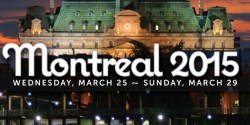From March 25th to the 29th, the annual Society for Cinema and Media Studies conference took place in Montreal, Quebec. The conference serves as a regular platform for the sharing of research in media studies and over the past few years, the presence of both radio and sound scholarship has been growing at an impressive rate.
This growth has been met with the establishment of Scholarly Interest Groups for both Sound and Radio Studies, which help to facilitate and sponsor topic-specific panels and to promote radio and sound research within the conference. As radio and sound research becomes a larger part of the annual conference, radio scholarship has been receiving more attention and coverage within the growing body of radio and sound researchers.
Antenna Blog, for instance, ran both a preview of radio-related research at the conference by Alex Russo, as well as a re-cap of the conference by Bill Kirkpatrick, which also comments on the state of the field within cinema and media studies. In Kirkpatrick’s review, he explains that at this year’s conference, he “felt a palpable confidence among radio scholars that hasn’t been there in years past.” A few of the key points that Kirkpatrick raises in reference to this year’s conference is that the number of radio-themed panels is growing, radio-related papers are increasingly included on mixed-media panels, and radio scholars are becoming more involved in larger disciplinary conversations.
These are very exciting findings which point to the fact that radio, as both a historical and contemporary research subject, poses numerous compelling questions for researchers. Take, for instance, the rise in a critical discourse and appreciation for podcasting. Additionally, online and streaming music services are continuously presenting new concerns and questions about new media industries and cultural labor, and the archiving of sound media is a daunting task that is receiving critical attention thanks to initiatives like the Radio Preservation Task Force. These recent development were all nicely reflected in the research shared throughout this year’s SCMS conference.
To give readers a sense of the range and scope of radio-related papers and panels featured at SCMS 2015, here are a few quick notes:
*This year’s conference featured a panel devoted entirely to the study of podcasting and one that explored the intermedial adaptations of War of the Worlds (a nice follow-up to the events of the 75th anniversary of the broadcast in 2013).
*Two radio workshops took place during the conference. The first focused on radio production cultures and the second asked questions about whether or not radio studies can benefit from a canon of works to teach from and reference in academic writing – and, of course, what may or may not constitute a “canonical work.” Many concerns were raised about a radio canon, particularly due to the interdisciplinary nature of radio studies. Workshop attendees also discussed the various ways that radio is being taught and implemented in media studies courses.
*Saturday was particularly rich in radio studies, with about five radio and sound panels and a handful of radio papers on multi-media panels. Topics covered included: local and national radio in the “long 1960s,” gender and crossover programming in the 1940s and 1950s, and public service media in an age of digital media convergence.
*The Radio Studies Scholarly Interest Group also held its annual meeting on Saturday, which featured a fascinating guest talk by Mira Burt-Wintonick, the producer of CBC’s WireTap. Her presentation discussed storytelling techniques at a time when listening practices vary widely in terms of the “closeness” of listening – between car speakers and headphones, for instance – and what this means for sound design. By crafting elaborate and detailed soundscapes, WireTap works to stand out from the many podcasts available to listeners. Sound design is also an avenue for creating emotional and intimate connections with listeners. Burt-Wintonick also discussed distribution methods and the different ways that the program is packaged for international distribution.
As I’ve been writing these posts and updates for the Radio Survivor Academic Series, I’ve been very pleased to see the field growing and to have so many updates to share – whether this is related to larger initiatives like the RPTF or a quick post that links to the work of other radio scholars. If this year’s SCMS conference is any indication, the next academic year should be a very prolific one for Radio Studies.



